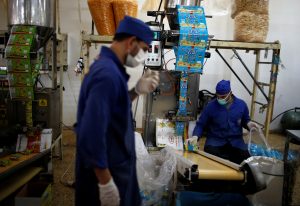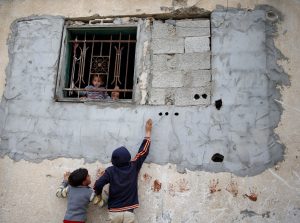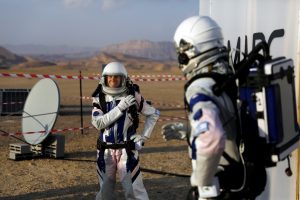
By Matt Spetalnick and Jeffrey Heller
WASHINGTON/JERUSALEM (Reuters) – U.S. President Donald Trump and Israeli Prime Minister Benjamin Netanyahu hold talks on Monday that offer a chance to project a common front against Iran but are expected to do little to advance seemingly stalled Israeli-Palestinian peace prospects.
Mired in corruption investigations threatening his political survival, Netanyahu was confronted, only hours before the White House meeting, by news back home that a former spokesman had turned state’s witness in one of the probes. Netanyahu has denied any wrongdoing.
U.S. and Israeli officials said the agenda of Netanyahu’s talks with Trump would be topped by the president’s push to change or scrap Iran’s 2015 nuclear deal with world powers and concerns over Tehran’s foothold in Syria.
Both leaders have railed against the deal, citing its limited duration and the fact it does not cover Iran’s ballistic missile program or its support for anti-Israel militants in the region.
Trump has threatened to quit the agreement unless European allies help “fix” it with a follow-up accord. An Israeli official said Netanyahu and Trump were likely to talk about how to overcome European resistance on the matter.
“I intend to discuss a series of issues with (Trump), but foremost Iran, its aggression, nuclear ambitions and aggressive actions in the Middle East, including along our very border,” Netanyahu told reporters on his departure from Israel.
Israel has accused Tehran of seeking a permanent military presence in Syria, where Iranian-backed forces support Syrian President Bashar al-Assad in a civil war.
Netanyahu has cautioned that Israel could act against Iran itself after an Iranian drone flew into Israel last month and an Israeli warplane was downed while bombing air defenses in Syria. He accuses Iran of planning to build precision-guided missile factories in Lebanon, amid tensions on that border.
“We want to know and we must know, what the U.S. position will be if we do enter into some wider confrontation with Iran,” Michael Oren, a deputy Israeli cabinet minister and former ambassador to Washington, said on Israel’s Channel 13 TV.
U.S. Secretary of State Rex Tillerson has called on Iran to withdraw its military and militia from Syria. But with Russia the dominant international player in Syria, it is unclear what practical steps Washington could take to ease Israeli concerns.
Trump and Netanyahu will also discuss efforts led by the president’s son-in-law and senior adviser Jared Kushner to develop an Israeli-Palestinian peace proposal, which the president has said could lead to the “deal of the century.”
The process has gone nowhere, however, since Trump’s recognition of Jerusalem as Israel’s capital in December and announcement of the move of the U.S. embassy to the city in May, shortly after Israel’s 70th anniversary.
Kushner is on the defensive amid investigations into alleged meddling by Russia in the 2016 presidential campaign. It is a case that has bedeviled Trump, who – like Netanyahu – has accused law enforcement officials of conducting a “witchhunt”.
Palestinian leaders have reacted to the change in decades-old U.S. policy on Jerusalem by rejecting Washington’s traditional leadership of peace efforts.
‘ROUTINE CHECK-IN’
No major announcements or breakthroughs are expected from Trump’s talks with Netanyahu, whose relationship with the president has been among the closest of any other world leader.
“This is a routine check-in meeting,” one U.S. official said of Netanyahu’s second visit to the Trump White House.
For Netanyahu, the Oval Office meeting and an address to the pro-Israel lobby group AIPAC on Tuesday offered little respite from his legal troubles in Israel.
His former spokesman, Nir Hefetz, is one of the suspects in a case revolving around allegations that regulatory favors were granted to Israel’s biggest telecoms company and that in return, its owners provided favorable coverage for Netanyahu on a news site they controlled.
Netanyahu awaits a decision by Israel’s attorney general on whether to indict him, as police have recommended in two other bribery cases.
U.S. officials have said the investigations in Israel are not expected to affect Netanyahu’s talks.
The Trump administration remains hopeful the Palestinians can be drawn back into negotiations after a “cooling-off” period, one U.S. official said, while conceding there had been no sign that would happen any time soon.
Some analysts believe Kushner’s ability to run the Middle East initiative has been further handicapped by his loss of access to certain valued U.S. intelligence because of a recent White House clampdown on access to such secrets for those without full security clearance.
The Trump administration has no plans to use Netanyahu’s visit to roll out peace proposals Kushner’s team is crafting, a second U.S. official said, speaking on condition of anonymity.
“We are as committed to peace as ever,” the official said. “We will release the plan when it is done and the time is right.”
U.S. officials have told Reuters it would deal with all major issues, including Jerusalem, borders, security and the future of Jewish settlements on occupied land and Palestinian refugees, and would also urge Saudi Arabia and other Gulf states to provide significant financial support to the Palestinians.
(Reporting by Matt Spetalnick in Washington and Jeffrey Heller in Jersusalem; Editing by Daniel Wallis, William Maclean)











